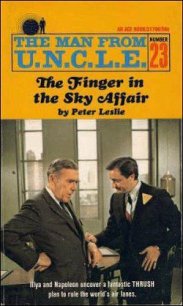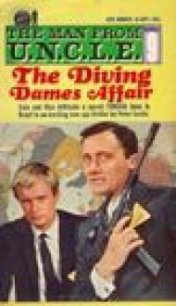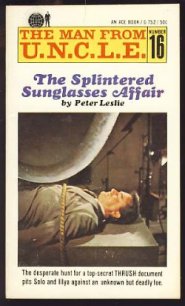The Unfair Fare Affair - Leslie Peter (читать онлайн полную книгу txt) 📗
He had in fact enjoyed the reputation of being the most up-to-date gossipmonger on Earth... until Solo and his partner, Illya Kuryakin, had unwittingly involved him with THRUSH.[2] After that, he had survived a bomb attack on his headquarters and gone to South America, where—with the connivance of Waverly—he had begun to set up a similar organization. [3]
He had indeed for a short time been an ex-officio member of U.N.C.L.E.'s overseas staff, in which capacity he had materially helped Solo and Kuryakin to foil one of THRUSH's more dastardly attempts at nuclear trouble-making... and now here he was, of all places, in The Hague!
As the barber drew a towel down over the huge face to remove the last traces of soap, the man in the next chair rose and left. Solo slipped into the vacant seat.
"Yes, sir?" A young man with glossy black hair shook a pink sheet and held it out for the agent to insert his arms in the sleeves. The man looking after Tufik was preparing hot towels.
"Shave, please," Solo said, glancing sideways. The fat man's eyes, buried in the rolls of flesh like currants in pudding, were closed.
"Very good, sir... er.. are you quite...?"
The agent looked up absently. The barber had fallen back a pace and was staring at him with raised eyebrows. "What is it then?" Solo demanded.
"You did say... a shave, sir?"
"Certainly."
"But... but... it can't be more than an hour since your... since you had..."
Solo's hand flew to his smooth, recently shaved chin. "Oh... Oh, yes. Yes, that's true. Well, I guess I'd better have... you can trim my hair, eh?"
"Of course, sir. Just as you wish." The young hairdresser looked at him oddly and fished a comb and scissors from his breast pocket. On the outside of the starched linen, the word "Colin" was worked in crimson silk.
"Pays to keep the hair well trimmed," Solo babbled idiotically. "My favorite uncle always advised it."
"Just so, sir." The young man raised his eyes heavenward in silent martyrdom and began to comb and snip. There was no discernible reaction from the next chair. Tufik—a mountain of sheeted pink surmounted by a cone of white towels through which steam rose gently into the air—looked exactly like a strawberry sundae topped with whipped cream, Solo thought.
"My Uncle Waverly," he added a little more loudly.
Among the vaporous towels a tremor manifested itself. A fold of the damp cloth subsided, and an eye was revealed. The eye opened and stared at Solo. Then it closed again.
Solo closed his own eyes and settled in his chair. "Not too much off the back, please," he said.
A few minutes later he heard a bustle of activity to one side as the fat man was divested of his robes and towels, helped on with his jacket, and brushed down. There was a rustle and a chink of money changing hands.
"Thank you, Mynheer," the barber's voice said unctuously. "It is more than kind.... Thank you.... Until the day after tomorrow, then..."
And then the familiar, fruity tones: "Ah, think nothin' of it, Anton; think nothin' of it. When you have it, you might as well spread it about a bit, boy! For there's none as will give you a sight nor a smell of it when you're without it at all.... Friday it is, then. And now I'll be on my way— there's them as is waitin' to see me by the canalside on Sint Pietersstraat..."
And with a squeak of rubber tires, the self-propelled wheel chair was gone.
Solo did not open his eyes. It wasn't necessary. He knew the big man too well to need to make sure. Tufik appeared to be a loquacious, even garrulous person, a heedless and friendly man born with the gift of the gab. Nothing could have been further from the truth. He was in fact a shrewd operator who planned every move—and every single word in his conversation was there because he wanted it to be there, for a purpose. He had mentioned the name of a street in the agent's hearing. That was good enough; it was as good as an engraved invitation to a meeting.
A few minutes later, Solo was talking to the hall porter. "Sint Pietersstraat?" the man repeated, scratching one side of his moustache. "Yes, I think so, sir. It should be... let's just have a look at the street plan of the city.... Yes! Square G6 on the grid... Here we are, see? A small street running by this canal. You'll find it off the Duikersteeg… second or third turn after the lights."
It was, in fact, Solo found, only four blocks from the hotel. The canal was narrow, its surface completely covered with leaves. There appeared to be no current and no traffic. On the far side, the high walls of warehouses and industrial buildings cut off the view. The street itself was bordered by small houses in rather poor repair—much shabbier and less imposing than the tall edifices in Amsterdam—and there was a towpath a few feet below it, to which, every hundred yards or so, a cobbled ramp led down.
Solo noted with some amusement that to reach the Duikersteeg he had to pass along Onkelweg—Uncle's Way.
Once in the Sint Pietersstraat, he hurried along the granite setts looking for some sign of Tufik. The wintry sunshine was still quite bright, but there was a keen wind blowing and the shadowed side of the road was cold. Some of the two story houses had stable-type half doors at the entrance, and over several of these, the top half being open, slatternly women leaned. One flabby creature, wearing what looked like the top portion of a swimsuit, called out something to him in a dialect too broad for him to understand, and a burst of laughter echoed down the street.
It was singularly like Tufik to live in or near a quarter fitted with half doors like an Irish village, Solo thought to himself. But where was the Irish-Moroccan?
And then suddenly he saw him. The wheelchair was below him and to one side, parked on the towpath by the extreme water's edge. The fat man, bulging massively over its frail structure, appeared to be gazing along the line of stunted trees whose fallen leaves had choked the surface of the canal. Solo quickened his pace and went down the nearest ramp.
Although he had his back to the agent, Tufik somehow sensed his approach. Before he reached the foot of the ramp, Solo saw the wheelchair turn through ninety degrees, so that it was facing away from the canal, and begin to move toward the wall separating the towpath and the roadway. Then, to his astonishment, Tufik was apparently swallowed up by the brick facade. As smoothly as a rehearsed stage exit, the sequence of events unfolded—Solo's approach, the fat man's realization of it, the spin of the chair, the unhurried progress to the wall… and the final disappearance of chair and occupant!
Slowing his walk to a casual saunter, Solo reached the bank, glanced across the water and then—as a tourist might regard and reject—swung back toward the street. And at once he saw how Tufik had vanished.
Recessed deeply in the brickwork, a series of low arches ran along below the surface of the road. Behind them, he guessed, were shallow cellars. Most of the arches were boarded up or bricked in. But in one of them a rough wooden door gaped open. The wheelchair must have gone through this.
Solo patrolled a few more yards of canal bank, turned, and began to stroll back in the direction of the ramp. After a little, he veered toward the wall.
Near it, he saw the brickwork cut off the view of the houses on the far side of the road and that he would be invisible from the upper stories. He hurried up to the arch with the open door. Inside, beneath the dark vaulted ceiling, there seemed to be only a kind of storeroom with rolls of wire netting, an iron barrow, a pile of planks and several oil drums stacked in a corner. He walked a couple of paces into the gloom.




